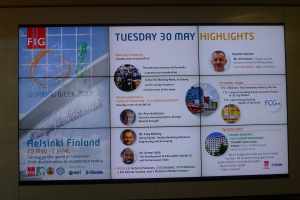News in 2017

|
Surveying the World of Tomorrow - From Digitalisation to Augmented
Reality, FIG Working Week 2017
29 May – 2 June 2017, Helsinki, Finland
Digitalisation version 2.0
The theme of the FIG Working Week 2017 focused on the future and the
possibilities of living in a digitalised world - not only digitalised,
but digitalisation version 2.0. This fitted very well to the destination,
Helsinki, Finland, which is
a perfect place of setting the scene for the future - as the future is only
one step away. Helsinki and Finland are a perfect example of future
oriented thinking, which the Finnish plenary speakers also demonstrated.
And what a future are we looking at…
The future was already demonstrated in the conference bag that was
handed out to all participants. The bags were chosen because of
sustainable responsibility, a CSR bag, caring for the environment that
include human rights, discrimination, child labour, working conditions
and a sustainable fabric. Inside the bags was another futuristic sign, a
set of Augmented Reality (AR) card-board glasses that – once sampled –
opened up to a virtual world of wonder.

FIG Working Week 2017 Augmented Reality Card Board Glasses |
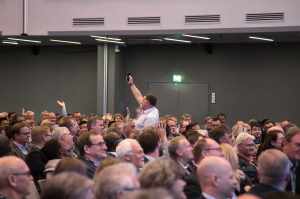
Key note speaker Ed Parsons making a 360
degree photo of the plenary hall and participants |
The logo of the conference was beautifully combining symbols of
Finland – the trees, the water the sun the northern light with the
symbols of the future in the digital world with the grid and the 1 and
0’s.
1400 participants found their way to a cool but beautiful Helsinki. 90
countries were represented at the Working Week to get closer to what the
future brings for surveyors. There were many ideas on this in both the
plenary sessions and the 400 papers presented in 57 sessions.
The Working Week and its many activities can be confusing for those
who attend for the first time. About 2/3 of attendees have attended
previously and many know each other across the globe, but for the 1/3 of
the attendees it can be both overwhelming and difficult to find ones
way. Therefore a new initiative was the Newcomers Session that took
place in the morning before the Opening Ceremony. This session gave an
insight into what FIG is and also how to navigate through the many
offers during the packed week. Around 70 fresh newcomers found their way
to this session.
Opening Ceremony with Northern Light and Sunrise
The Northern Light glowed on the sky until the sun took over and rose
over Finland while Finlandia by Jean Sibelius was beautifully played by
Cello and Piano to mark the opening of the Working Week. There could not
have been a more Finnish, beautiful and moving way to open the three
busy conference days of the Working Week.
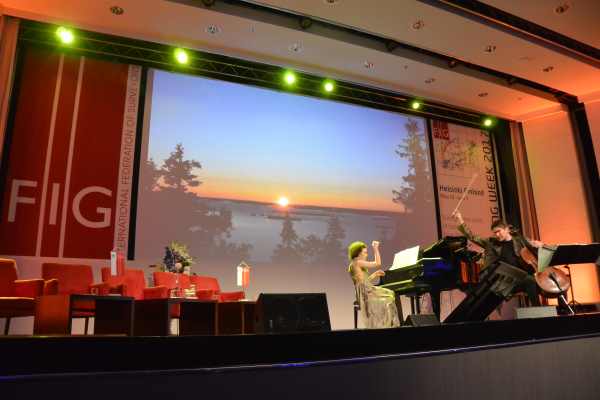
The Opening Ceremony was introduced by Co-Conference Director Pekka
Halme who had been in charge of the Local Organising Committee, followed
by Mr. Jari Leppä, Minister of Agriculture and Forestry.
Only very seldom the Working Week takes place in a country that also
host a Honorary President. Juha Talvitie who was FIG President in 1990,
the last time the FIG Congress was held in Finland, gave an welcome
address. Young Surveyors are close to his heart and he warmly welcomed
all the younger representatives of the profession with the hope that
they will take forward the profession for many years so that the FIG
Working Week can again take place in Finland around 2038…
FIG President Chryssy Potsiou said in her opening address that
“change continues, as it always has and always will, inexorably. Change
in the surveyor’s world is not limited to technological invention.
Systems and processes are just as growth-oriented as the hardware that
we use. The formation of FIG in 1878 was the beginning of the
globalization of our profession. First it was the organization of
surveying associations of a mere seven western European countries; today
it is over one hundred. Today modern globalization is being
questioned for its fairness and efficiency, yet we feel its effects on
our profession.”

FIG President Chryssy Potsiou, Honorary President Juha Talvitie,
Finland and Minister of Agriculture and Forestry, Mr. Jari Leppä,
photo by Antero Aaltonen |
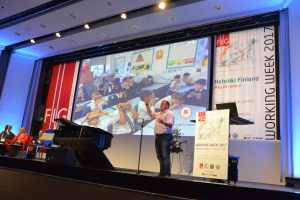
Key note speaker Ed Parsons encouraged all participants to use
the cardbord AR Glasses that were included in the participants
package |
Ed Parsons, google was key note speaker in the opening ceremony
talking about Digitalisation – version 2.0. He stated that: "Talking
about this idea Digitalisation version 2.0 the key point here, I think,
is that we must make the most of the opportunity that these technologies
give us. And that means not just taking an existing process and making a
digital version of that. That’s kind of where we have been a little bit
in the past. But to use the opportunity that geospatial technology
provides us to come up with a completely new way of doing things. That
is what I’d say Digitalisation version 2.0 is. The first version of a
digital process was to take the existing process and make a computer
version of that. What we have got the opportunity to now is to look at
these new technologies and say, well are there just completely different
ways of doing things?” This Digitalisation version 2.0 will have a
significant impact on the surveying profession.
FIG Honorary Ambassador
The General Assembly decided to appoint Paul Munro-Faure, FAO, FIG
Honorary Ambassador, and he received his certificate at the opening
ceremony by President Potsiou. Paul Munro-Faure has for many years had
an active role within FIG, both in commission 7 and by linking close
ties between FIG and FAO, especially in the work on the Voluntary
Guidelines, VGGT. Paul Munro-Faure stepped down from his position as
deputy director of FAO in Spring 2017. Inthe acceptance speech of Paul
Munro-Faure, he said: 2017 is thirty years from the date when I was
appointed as United Kingdom delegate of Commission 7 by my member
association, the Royal Institution of Chartered Surveyors, RICS. It is
twenty seven years from the date of the first FIG Congress I attended;
Here in Helsinki under President Juha Talvitie. It was a remarkable
Congress; A transformative event. The FAO and FIG relationship was
formalised in 2002 when President Bob Foster joined me in Rome for the
signing of the Memorandum of agreement between our two organizations."
Read the speech of Mr Munro-Faure:
www.fig.net/news/news_2017/05_ww_munro-faure.asp
Plenary sessions – “Change or Die”
The three plenary sessions were a source of inspiration and
responding to the theme of the Working Week: ‘Surveying the World of
Tomorrow’ with the three sub themes: 1 Living of Tomorrow – In a
Digitalised World,2. Professional behaviour – In a Digitalised World
and 3. The Contribution of our Profession – In a Digitalised World.
Arvo Kokkonen, National Land Survey Finland, raised the question if the
surveying sector is changing quick enough? He predicted a future with
“many players in the field” as land information will be even more
recognised as part of the basic infrastructure. Greg Bentley, Bentley
Systems, had a fascinating keynote on ‘Going digital: reality modelling
advances surveying, and engineering…’. According to Greg reality
modelling will go mainstream, and future key words will be:
“Conceptioneering”, “Constructioneering”, “Inpectioneering” and
“Productioneering”. Oumar Sylla, Global Land Tool Network, highlighted
in his keynote the relevance of land information as key ingredient for
realising the sustainable development goals. Tenure security for all is
one of the goals where surveyors worldwide play a vital part in it.
Robert Guinnes, Finland, brought future trends in pervasive positioning
– accuracy, availability and reliability of GNSS will increase. Yola
Georgiadou from ITC, Twente University, had a highly interesting
contribution on geo-ethics, which may have been an eye opener for many –
what does ethics and surveying have to do with each other? Most likely
not many have thought of this perspective. Jolyne Sanyak, Landesa,
presented ‘How can we favour secure land rights for the digitalized
world we want?’ She explored innovative and more affordable technology
and how to democratize data gathering. Markku Poutanen went back to the
’origin with a very nice overview of the future of reference frames.
Fredrik Zetterquist wondered if we embrace the global transformative
forces – with a showcase on cadastral procedures conducted by the
citizen.

Fredrik Zetterquist introduced the UN-Sustainable Development
Goals |
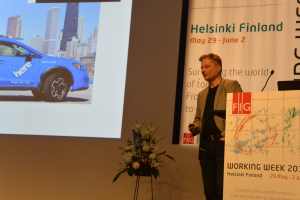
Juha Hyyppä finalised his presentation dramatically by stating "Change or Die" |
The most provocative key note came from Juha Hyyppä, the Director of
Remote Sensing and Photogrammetry of the Finnish Geospatial Research
Institute who finalised the row of plenary speakers giving the audience
a vision to think of while back home. His presentation ‘Disruptive
Technologies Threatening National Mapping and Agencies Centralized
Mapping’ included that in the next two decades, new mobile laser
scanning systems are making laser scanning more ubiquitous. Even
autonomous robots using point-cloud-generating perception sensors may be
added to the ecosystem during this timeframe. Juha is convinced that
during the 2020s and 2030s there will be a great number of laser
scanners omnipresent in everyday life. Mobile Laser Scanning is also one
of the main techniques to create local virtual reality. Physical and
virtual worlds will be merged. His presentation was illustrated with
many examples – where cadastre was missing… Even if the use of imagery
is promoted in that area. He proposed action items – amongst them a
national topographic database with high-quality point clouds and images.
‘Change or Die’ was his final message…
Historic Map Exhibition
Centrally placed in the conference centre, a Historic Map Exhibition
was presented. A Historic Mercator map showing the Nordic countries was
one of the maps in this special exhibition. This map was part of Geradum
Mercator’s series of regional maps and was part of the first atlas of
the world. This atlas was published in 1595, the year after the death of
Mercartor. The map was bought by National Geodetic Institute of Finland
in 2013.
Sessions
The variety of sessions was large spanning over all the areas of
surveying. A new feature was the Inspirational Sessions (ISS) inviting
presenters to give 5 minute inspirational speeches which in the last
part of the session were basis for interesting and more in-depth
discussions. These sessions were well visited, vivacious and provided a
breeding ground for lively discussions.
There were also several sessions organised jointly with the
conference institutional partners, World Bank, FAO and UN-Habitat/GLTN.
Hereto several meetings were held with members and stakeholders.
Pre events
The Working Week already started on Sunday 28 May with three pre
events: BIM, History and Young Surveyors European meeting. All three
events were well visited. The History Symposium offered several
contributions from the Nordic countries and also from Serbia, Canada and
Croatia. The Struve Geodetic Arc and the Enhancement From North
Cape to Cape Agulhas in South Africa – the Longest Meridian on Earth
were presented – highlights in Geodesy. Fascinating were the
contributions on the surveyors in the Roman Empire. Two books by Swede
Martin Ekman on Celsius and 500 years of Nordic Mapping were brought
over by FIG Vice President Mikael Lilje.
The BIM for Surveyors Workshop attracted more than fifty
professionals and academic engineers from 27 countries. Building
Information modelling is the key for the implementation of digital
models and processes for the construction industry. The workshop showed
that surveyors play a crucial role in BIM design and implementation:
managing project and asset data with proper coordinate reference
systems, linking the construction project to GIS, measured surveys of
the built environment using terrestrial laser scanners, setting out and
machine guidance, linking virtual building models to land management,
tendering and costs. Surveyors make BIM work properly.
Again in 2017 FIG Young Surveyors successfully had their Fifth FIG
Young Surveyors European Meeting. They also organised various sessions
within the overarching FIG Working Week. Merging those two events
allowed young surveyors from all over the world to participate and
experience the full range of FIG events and activities. The atmosphere
was energetic, and the participants shared news and reports on their
activities, research and work. The highlights got shared through the YSN
social media channels, allowing young surveyors all around the world to
join and interact.
Exhibition
22 exhibitors found their way to Helsinki and the Working Week
showcasing their latest products, machinery and technology and there
were lively discussions around the exhibition area that was also used
for lunches and coffee/tea breaks.
Social events
The social events and other activities outside the session rooms are
also of great importance for the networking between the participants
which is also a cricial part of the participation at the Working Week.
The possibility to talk fid and find others from around the world with
similar challenges, or ideas that are worth bringing back home.
City Hall of Helsinki was the venue of the Welcome reception with
City of Helsinki as host of the event. FIG President Potsiou thanked the
City and Mayor for this very kind gesture, and expressed thanks to NLS
and the Finnish Associations, MIL and MAKLI for bringing the Working
Week to Finland and Helsinki. Helsinki is a very interesting example of
city development – the planning actually in cooperation with Bentley
Systems.
The Finnish evening which is also the FIG Foundation/Trimble dinner
included several surprises such as welcome incl military brass band,
Kahden Pennin Orchester and finally the nice evening ended with a
Finnish rock band playing heavy rock that could fill up the dance floor
with all kinds of nationalities.
The Gala Dinner took place in the famous Finlandia Hall Foyer. A
spectacular Cello Ensemble entertained spanning from Sibelius to a piece
of music on the Formula 1 race with the Cellists both playing and
performing.
Before the Gala Dinner the Young Surveyors together with other
youngish-feeling participants, in total 129 fresh surveyors found their
running shoes and participated in the Charity Run organised by the Young
Surveyors. The Charity run took place in Töölönlahti park. In total the
Charity Run collected 1,290 EUR that will be equally shared between FIG
Foundation and Humanitarian Open
Street Map.

Foundation Dinner opening. Photo by Antero Aaltonen |

Welcome Reception was held at the beautiful Helsinki City Hall |

Gala Dinner entertainment by Cello Ensemble in Finlandia Hall |
|
Closing ceremony
At the Closing Ceremony FIG President Potsiou thanked all involved in
the preparations and execution of the Working Week. It was a busy week
with many and varied activities, and President Potsiou stated: “our role
as “change agents” is critical if we are to bring these concepts and
tools into concrete actions”, referring to both the work done by the FIG
Commissions, Networks, Permanent Institutions and Task Forces, and
indeed also in the continued cooperation with World Bank,
UN-Habitat/GLTN, UNGGIM and FAO and other UN organisations, working
jointly towards the UN Sustainable Development Goals.
The days were long and the nights were short in June in Helsinki,
which was an extraordinary experience for many participants - and the
Working Week also brought long and action-filled days and short nights
due to the activity level of the Working Week.
Links
Louise Friis-Hansen
30 June 2017

























